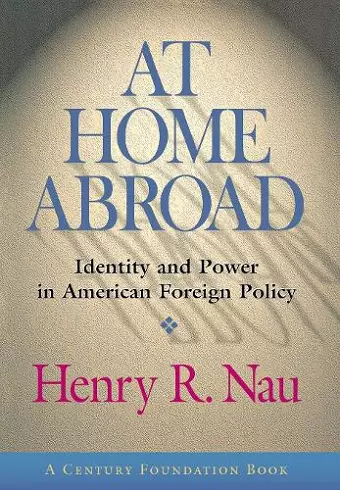At Home Abroad
Identity and Power in American Foreign Policy
Format:Hardback
Publisher:Cornell University Press
Published:25th Feb '02
Should be back in stock very soon

The United States has never felt at home abroad. The reason for this unease, even after the terrorist attacks of September 11, 2001, is not frequent threats to American security. It is America's identity. The United States, its citizens believe, is a different country, a New World of divided institutions and individualistic markets surviving in an Old World of nationalistic governments and statist economies. In this Old World, the United States finds no comfort and alternately tries to withdraw from it and reform it. America cycles between ambitious internationalist efforts to impose democracy and world order, and more nationalist appeals to trim multilateral commitments and demand that the European and Japanese allies do more.In At Home Abroad, Henry R. Nau explains that America is still unique but no longer so very different. All the industrial great powers in western Europe (and, arguably, also Japan) are now strong liberal democracies. A powerful and peaceful new world exists beyond America's borders and anchors America's identity, easing its discomfort and ending the cycle of withdrawal and reform.Nau draws on constructivist and realist perspectives to show how relative national identities interact with relative national power to define U.S. national interests. He provides fresh insights for U.S. grand strategy toward various countries. In Europe, the identity and power perspective advocates U.S. support for both NATO expansion to consolidate democratic identities in eastern Europe and concurrent, but separate, great-power cooperation with Russia in the United Nations. In Asia, this perspective recommends a shift of U.S. strategy from bilateralism to concentric multilateralism, starting with an emerging democratic security community among the United States, Japan, South Korea, Australia, New Zealand, India, and Taiwan, and progressively widening this community to include reforming ASEAN states and, if it democratizes, China. In the developing world, Nau's approach calls for balancing U.S. moral (identity) and material (power) commitments, avoiding military intervention for purely moral reasons, as in Somalia, but undertaking such intervention when material threats are immediate, as in Afghanistan, or material and moral stakes coincide, as in Kosovo.
An engaging, wide-ranging study, At Home Abroad warrants the attention of all who write or think seriously about contemporary international relations.
-- Robert J. McMahon, University of Florida * The Journal of American History *At Home Abroad has something for everyone.... Scholars will find value in Nau's novel synthesis of competing paradigmatic traditions. Policy makers and nonprofessionals with special interest in international affairs should be pleased with the authors straightforward prose, his concern with the real world of diplomacy, and his willingness to offer concrete policy recommendations.
-- Stephen R. Rock, Vassar College * Political Science Quarterly *Nau here strives to transcend the perennial, and sterile, debate between realists and idealists over the proper shape of American foreign policy.... Solid and well argued if not outstanding, At Home Abroad belongs in all international affairs collections.
* Library Journal *Not only did the 'conventional' interpretive and prescriptive frameworks... fail to predict or explain the outcome of the Cold War, but none appears to offer an adequate foundation for examining or navigating the post-Cold War environment. At Home Abroad is a smart, challenging effort to guide scholars and policy makers out of this quagmire.... Nau's book exceeds the sum of its parts and warrants close reading.
* Choice *One of the most significant aspects of Nau's book is that he considers identity and power as equally influential in foreign policy-making.... Nau's approach is thought-provoking and relatively refreshing. He makes cogent arguments and his book should be widely read by those concerned with the future directions of US foreign policy and international affairs more generally.
-- Trevor B. McCrisken, UWE Bristol/Rothermere American Institute, Oxford University * International Affairs *When Henry R. Nau writes about America in this intriguing book, his profound ideas and incisive explanations sweep across the landscape of American foreign policy. Everyone who wants or needs to understand who Americans are, where they are headed, and why, would be rewarded by spending a few hours with this volume, which is especially pertinent to the era that began on September 11, 2001.
-- Richard Halloran * Far Eastern Economic ReviISBN: 9780801439315
Dimensions: 235mm x 155mm x 25mm
Weight: 907g
336 pages